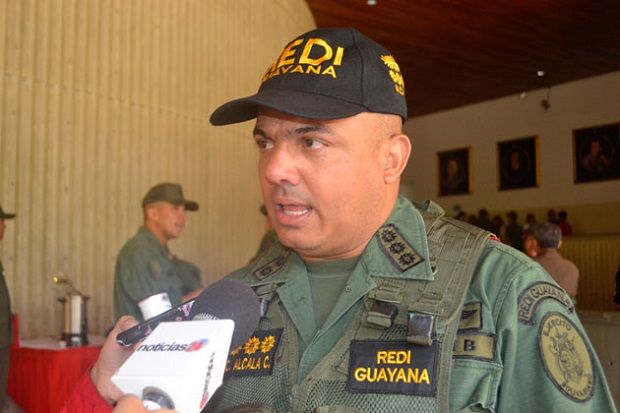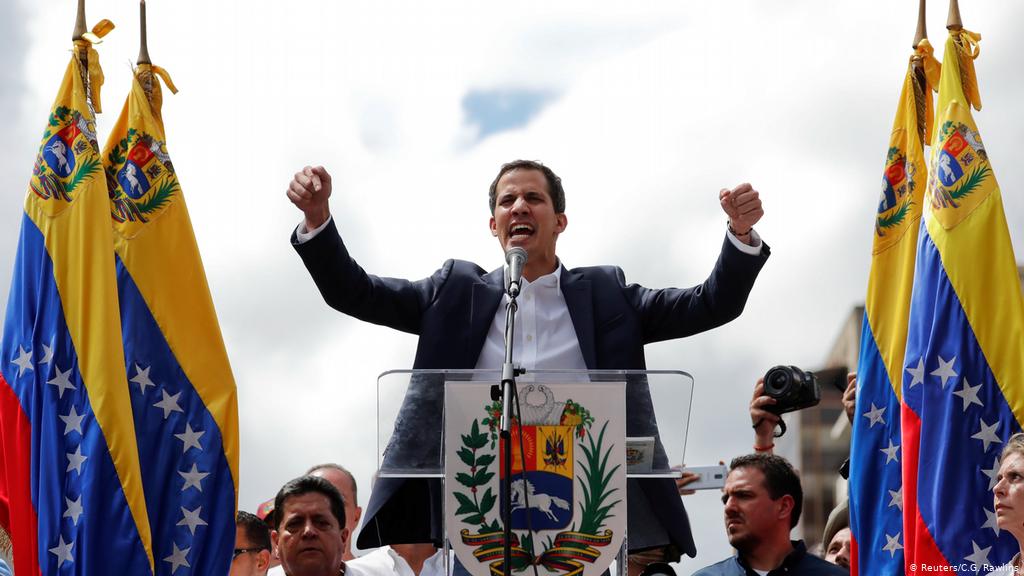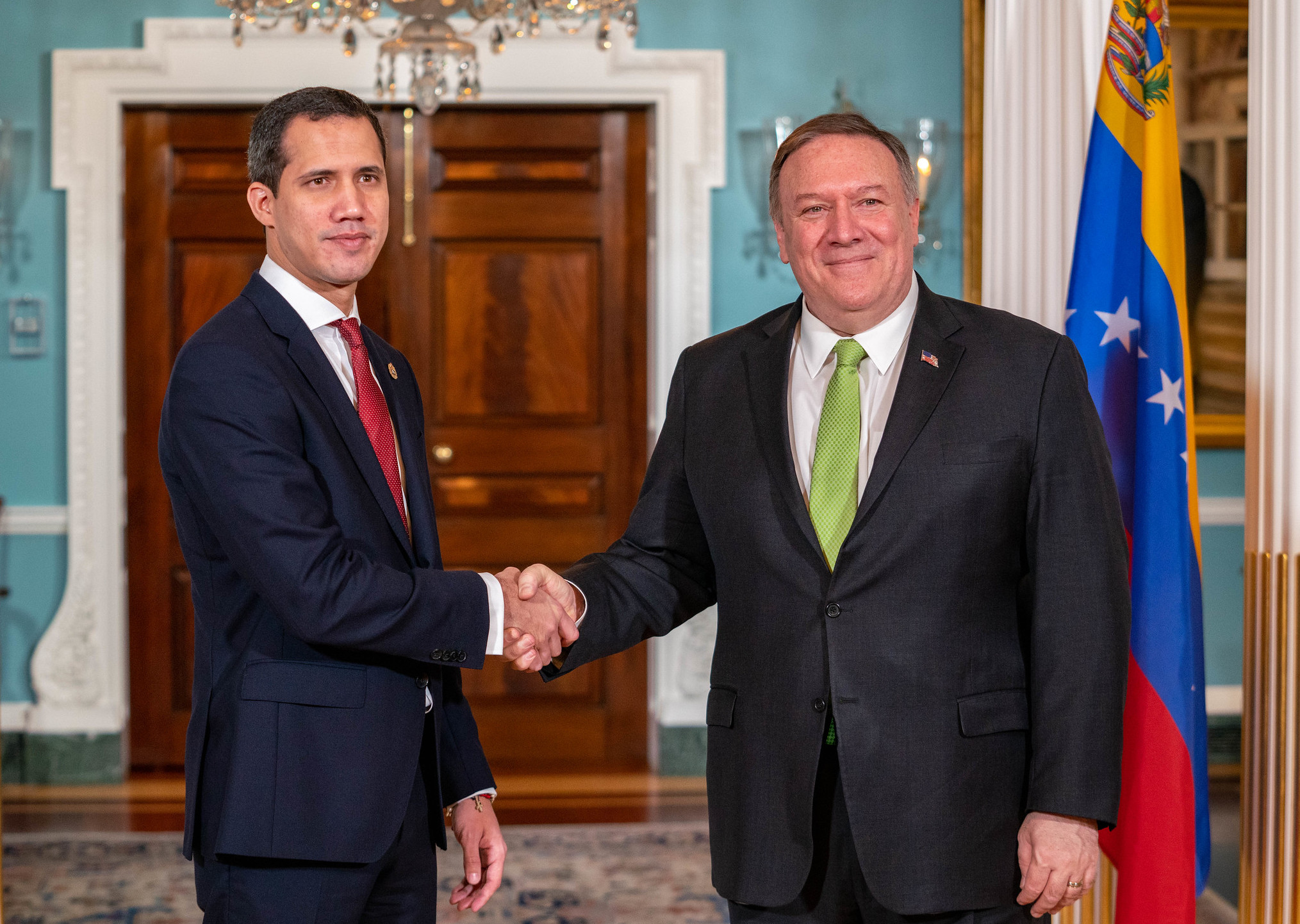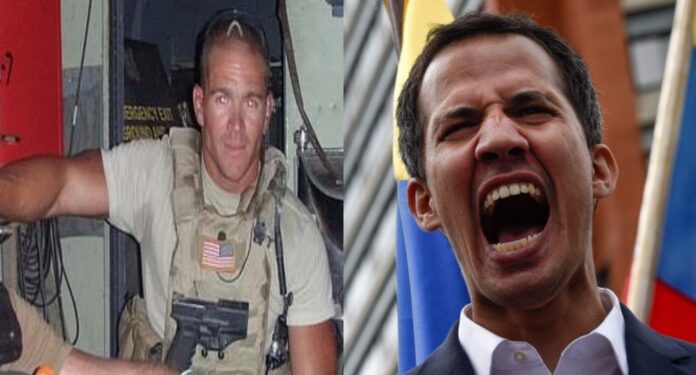
Venezuela Coup Plotters Met at Trump Doral. Central Figure Says US Officials Knew of Plan
Antonio Maria Delgado, Kevin G. Hall, Shirsho Dasgupta and Ben Wieder / The Miami Herald and McClatchy News
(October 30, 2020) — In a challenge to denials of government involvement, the ex-US special operations sergeant whose security firm took part in a botched Venezuelan coup last May said two Trump administration officials met with and expressed support to planners of Operation Gideon, a Bay of Pigs-type operation that tried to oust Venezuelan strongman Nicolás Maduro.
It’s a story of bungling, bravado and cloak-and-dagger plotting, with plans shared in clandestine meetings in the back of limousines while rolling through Miami, in restaurants and even at dusk on the 12th fairway of the Red Course of Trump Doral, the Miami Herald/McClatchy has learned.
Details have been elusive, even as Gideon’s planning and execution happened in the nation’s capital, South Florida and across the Caribbean Sea in coastal Venezuela. The allegations reported exclusively in this story are also contained in a $1.4 million breach-of-contract lawsuit filed Friday, Oct. 30,by Miami attorney Gustavo J. Garcia-Montes in Miami-Dade Circuit Court.

Venezuelan President Maduro holds up coup evidence following arrest of US mercenaries.
The suit is against Juan Jose Rendon, a political consultant closely aligned with Venezuelan legislator Juan Guaidó, who the Trump administration in January 2019 began calling the legitimate president of the oil-rich South American nation.
It was brought on behalf of retired Sgt. 1st Class Jordan Goudreau, who in roughly seven hours of detailed interviews insisted he had encouragement from the administration and even held meetings to plan the operation at the Trump Hotel in the nation’s capital and at the Trump Doral west of Miami. Reporters worked on fact-checking Goudreau’s data and allegations over a six-week period.
The goal of Gideon was to replace Maduro by installing Guaidó, whose name appears on a contract purportedly signed with the coup plotters. The complete document — obtained by reporters from the Miami Herald and McClatchy, its parent company — contains a never-before-seen clause that allows Guaidó to disavow any involvement if the mission failed.
The reporters also obtained a recording, first cited by the Washington Post, of what appears to be Guaidó speaking in English to the plotters, encouraging them and celebrating their just-signed contract to provide help in procurement, logistics and “project execution advisement.”
An addendum to the contract said Silvercorp “will advise and assist … in planning and executing an operation to capture/detain/remove Nicolás Maduro (heretoafter, “Primary Objective”), remove the current regime, and install the recognized Venezuelan President Juan Guaidó.”
The men who were present during the signing have not disputed the events or their signatures.
“I do have concerns but we are doing the right thing for our country and we are in a humanitarian crisis,” the man believed to be Guaidó in the recording tells Goudreau, the decorated ex-Green Beret who ran a Florida-registered security company, Silvercorp USA, which participated in the attempted coup.
The failed coup resulted in the May 3 capture of two former American soldiers and 47 Venezuelans and led to the death of six would-be freedom-fighters who appear to have been executed.
Text chats shared by Goudreau suggest that at least one meeting took place at P.J. Clarke’s, a restaurant just blocks away from the White House, while testimonials from those involved suggest that top opposition figures were briefed at different points on the plot, including Guaidó and the head of his political party, Leopoldo López, who escaped Venezuela last week.
Goudreau’s assertions are strongly denied by the people he identifies, although few were willing to do so on the record.
They alternately called him a rogue operative facing possible federal indictment, a soldier disparaging the Venezuelan opposition in hopes of getting his two men freed or a con man seeking a Netflix deal.
Who is telling the truth? Inconsistencies abound on all sides of this tale. The events occurred in and around the lawless border of Venezuela and Colombia, where spies, smugglers and gun runners rub shoulders and distrust their own shadow.
A deal was cut to provide humanitarian aid through this border, or to launch an insurrection. Or, perhaps both.
Saying little in the months that followed the failed operation, Goudreau said he came to feel abandoned and scapegoated. He decided to break his silence and name the people he said had knowledge of his efforts to overthrow the Maduro regime.
He also said in his lawsuit he had seen a competing offer of assistance to the Guaidó administration purportedly from Erik Prince, brother of Education Secretary Betsy DeVos and owner of the security firm Frontier Services Group. This is denied by Prince, who is mentioned in Friday’s lawsuit.
Goudreau’slawsuit identified two Trump administration officials he said had prior knowledge of his plans. They are Andrew “Drew” Horn, at the time an aide to Vice President Mike Pence, and Jason Beardsley, a former soldier who is an adviser at the Department of Veterans Affairs.

A screengrab of Jason Beardsley — identifying him as an employee of the Department of Veterans Affairs — from an online video event organized by the VA in October. DEPARTMENT OF VETERANS AFFAIRS
A self-described retired Marine and ex-special ops soldier in Afghanistan, Horn was in Goudreau’s contacts under a cellphone number tracing to Tallahassee, where Horn’s LinkedIn page says he worked in 2005. It also said he was an intern for then-Rep. Pence in 2003.
The phone’s voice-messaging system identifies its owner as Drew Horn. He did not answer multiple calls and messages with detailed questions sent to that phone.
A spokesperson for Pence said the vice president does not know Horn, although Horn’s LinkedIn page identifies him as a former associate director of policy for Pence and now an adviser to the Director of National Intelligence.
“Vice President Pence had absolutely no knowledge of the rogue plot in Venezuela and does not know Mr. Horn,” said the spokesperson, Devin O’Malley.
Two top aides in the vice president’s office said they had no knowledge of Horn’s alleged awareness or activities and characterized the suggestion as “preposterous.”
“Drew Horn was a Department of Energy employee who was detailed to the vice president’s office as a detailee on the domestic policy team,” one senior administration official told McClatchy. “He was not assigned any responsibilities in the national security portfolio, and he was not assigned any issues related to Venezuela.”
Goudreau also claims that key representatives of the Guaidó governing team played a very hands-on role in setting the plot in motion, through discussions held in South Florida and at times Colombia.
Once deemed one of the richest countries in Latin America, Venezuela today is among the poorest, its economy left in ruins by decades of runaway corruption.
The overall hellish conditions have prompted as many asfive million Venezuelans to flee their homes in recent years, often heading toward neighboring countries on foot, experts say.

ALLEGED DRUG THUGS
The main Trump administration charge against the Maduro regime is that it has turned Venezuela into a narco-state, entering into partnership with Colombian guerrillas to export drugs to Europe and the United States through a military-controlled organization known as the Cartel of the Suns.
This became a problem for the Gideon operation. Retired Venezuelan Gen. Cliver Alcalá, a former Maduro ally who strongly supported the Gideon efforts, was targeted by the DEA for his alleged role in helping the Maduro regime move drugs.
The DEA offered a $10million reward for capture of Alcalá on March 26, and he surrendered soon after in Colombia to the DEA, saying he wanted to fight the charges. He was quickly extradited to the United States.
“Not only was he the brains for the [Gideon] operation, but more importantly he had the guts to act,” a Venezuelan officer who helped in the planning told the Herald and McClatchy. “He was the only general who instead of resorting to Twitter and Instagram … was willing to fight and even die for the country.”
Almost inexplicably, the undermanned Gideon operation continued despite the loss of Alcalá, one of its vital elements.
The Silvercorp USA plan, first reported by the Associated Press and the Military Times in May, was to infiltrate the country through the seaside town of Macuto with around 100 Venezuelan exiles and incite a popular rebellion against the government. This against-the-odds plot had parallels to the failed 1961 Bay of Pigs incursion in Cuba, backed by the CIA and involving roughly 1,400 exiles.
Among Silvercorp’s objectives was the extradition of Maduro to face justice in the United States. The effort was code-named Operation Gideon (or Operación Gedeón in Spanish) after the military leader from the Hebrew Bible who led a vastly outnumbered Israelite army to decisive victory.
The failed operation led to the capture of Airan Berry and Luke Denman, both former special forces associates hired by Goudreau. Their images were broadcast widely on Venezuelan television, face down with their arms tied behind their backs. They were each hastily sentenced in Venezuela to 20 years in prison in August under questionable due process.
A few weeks after the failed incursion, the FBI on May 21, 2020, raided a Boca Raton apartment where Goudreau was visiting and seized $56,800 in cash. A seizure notice obtained by the Herald and McClatchy identified the FBI’s Tampa office as responsible for the raid. “We do not confirm or deny the existence of an investigation,” said the FBI Tampa office in a statement, when asked by the Herald and McClatchy what the investigation entails. Goudreau’s lawyer said the money had been withdrawn from his bank account and did not come from Venezuelans or others overseas.
Goudreau, who was awarded three Bronze Stars for combat valor during his military career, alleges the FBI sought to lure him into a “death-by-cop” confrontation in the raid. Another participant in the coup effort confirmed Goudreau is the subject of an ongoing federal investigation.
Taut and muscular, Goudreau sat for online video interviews with Herald and McClatchy reporters from an undisclosed location. His lawyer provided what he said were the entire contents of Goudreau’s phone with contacts, social media chats, emails, text messages and photos and videos taken at training camps in Colombia. The FBI has the same contents, said Garcia-Montes, his attorney.
“I don’t care about clearing my name. I just want my guys. The guys who did this are good dudes. They are patriots,” Goudreau said, explaining his motivations and saying he had believed the coup would give Venezuelans hope to fight the regime.
“I want people to know the good guys are absolutely being [expletive] hunted down,” he said.

Juan Guiadó, the US-backed, self-appointed leader of Venezuela
NAMING ADMINISTRATION NAMES
The special ops veteran insists his support of an attempted coup was encouraged by some in the Trump administration, including Horn and Beardsley, the Department of Veterans Affairs adviser who is also a former special forces veteran and an early and prominent African-American supporter of Trump.
Reached by cellphone, Beardsley politely declined to comment. Christina Noel, a spokesperson for the Department of Veterans Affairs, refused to say whether Beardsley was still an adviser there — something later confirmed by three veterans services organizations that have worked with him since 2018.
According to the lawsuit against Rendon, Goudreau was introduced to Horn and Beardsley by Washington, D.C., lobbyist Travis Lucas, whom Goudreau said he first met in October 2019 at the urging of Nestor Sainz, a former State Department official who was allegedly among the plotters.
Goudreau said the October 2019 meeting with Lucas occurred at the coffee shop of the Trump Hotel in Washington.
Lucas was one of the lawyers representing President Trump’s former bodyguard Keith Schiller in 2017 when Schiller was interviewed by the House Intelligence Committee as part of its inquiry into Russian interference in the 2016 presidential election.
Lucas in turn introduced him to Horn and Beardsley and they met multiple times, Goudreau said. The lawsuit alleges that “Horn assured Goudreau that licenses from the United States Government regarding the procurement of weapons and armaments for the project were forthcoming.”
“Drew Horn originally wanted to set up a meeting between myself and Donald Trump at Mar-a-Lago … a direct face-to-face but that never happened,” Goudreau alleged in the interview.
“The expectation [from Horn and Beardsley] was that we were gonna help facilitate, to help flip the country.”
The lawsuit also alleges that Lucas suggested Beardsley be “involved in efforts to fulfill the requirements” of the contract.

Photos of the ‘General Services Agreement’ allegedly signed by Juan Guaidó and an addendum specifying a built-in deniability clause in case the operation fails. JORDAN GOUDREAU
Invoices and emails from Lucas, and shared with the Herald and McClatchy by Goudreau, show that Lucas charged him a total of $30,000 in December 2019 for navigating laws related to foreign lobbying and federal regulations governing the export of weapons.
“As an attorney, I cannot and do not discuss my interactions or communications with prospective clients or clients,” said Lucas in a statement through his own lawyer.
“I played no role whatsoever in the failed coup attempt in Venezuela, had no knowledge about the coup attempt before it transpired, and never discussed or communicated with any US government official regarding a coup or uprising in Venezuela. Any suggestions to the contrary are completely false.”

THE BODYGUARD
A close associate of Schiller’s, demanding anonymity in order to speak about what at the time was planned litigation by Goudreau, spun a different narrative.
The associate’s narrative was that Lucas met Sainz, the former State Department official, at a conference and invited Schiller, who lived in South Florida, to a meeting in Miami about humanitarian aid to Venezuela. Schiller brought along Goudreau, who had been recommended by a friend who had worked with the red-headed ex-soldier in Puerto Rican hurricane relief efforts.
The discussions centered on logistics and security for humanitarian aid, and Schiller never had another meeting on the matter, said the associate. Schiller runs a security consultancy called KS Global Group and media reports in 2018 said he was paid handsomely by the Republican National Committee for unspecified consulting work.
On Goudreau’s assertion of a subsequent meeting at the Trump Hotel near the White House, the associate said Schiller bumped into Goudreau there but it was not a meeting and the two never crossed paths again.

Vergara, Rendon and Goudreau
UNDER VENEZUELAN EYES
The lawsuit filed Friday against Rendon seeks to recover $1.4 million from Rendon, the confidante of Guaidó, the Venezuelan recognized by the Trump administration as the legitimate leader of his country.
Rendon is a political consultant with a Miami residence appointed by Guaidó to lead a “Strategy Committee” tasked with exploring options to oust Maduro and allegedly signed the contract as a representative of the Guaidó administration. Rendon declined to address Goudreau’s allegations.
Goudreau also claimed high-ranking members of Guaidó’s governing team played an active role in the planning of the operation, at one point demanding $20 million be set aside to finance an internal popular uprising to go alongside the military incursion.
Goudreau’s lawsuit said that his plan was given the go-ahead over competing plans and that the group had considered one purportedly submitted by Prince, the founder and former CEO of defense contractor Blackwater, that would have called for 5,000 troops and carry a price tag of $500 million.
Reuters reported in April 2019 that Prince had been shopping a plan to topple the Maduro regime using mercenary soldiers. Prince denied that he ever submitted such a plan.
“Erik Prince never made any such proposal to the Guiado government, but he does believe strongly that any action taken in Venezuela must be swift and decisive to avoid a protracted civil war,” his lawyer Matthew L. Schwartz said in a statement.

Juan Guaidó and US Secretary of State Mike Pompeo.
OPERATION GIDEON
A Canadian by birth, Goudreau served in the US Army for 15 years — 13 of them as a Special Forces member. After receiving an honorable discharge in 2016, he said he worked security for the Trump 2016 campaign and later in Puerto Rico providing post-hurricane security.
Jordan Goudreau working security at what appears to be a political event for Donald Trump. JORDAN GOUDREAU
From May to August 2019, Goudreau said he attended multiple meetings in Miami and Colombia where they discussed the overthrow of the Maduro regime.
Among the people he met with in these meetings was Sainz, the former State Department official, who did not return requests for comment left on his phone and through colleagues. Another person identified in media reports in May and in the lawsuit as a funder of the operation was Roen Kraft, a mysterious heir to the cheese-making family. He could not be reached for comment.
Others identified in the lawsuit as part of the planning included Jorge Betancourt, who Goudreau said was a representative of Venezuelan opposition leader Leopoldo Lopez, and Lester Toledo, another Lopez-tied opposition figure.
“I had several Zoom conferences with Leopoldo Lopez and I talked to him over the phone,” Goudreau said.
Toledo admits to having met with Goudreau a few times, but only to discuss getting food aid into Venezuela, and dismisses some claims made by the ex-US soldier about monetary diversion as “ridiculous.“
Goudreau also said that in August 2019 Kraft told him he had spoken to Pence about the project.
“According to Kraft, Vice President Pence stated that he was very interested in the project and that as soon as it was successful, ‘all doors would be open,’” the lawsuit alleges.
Pence spokesperson O’Malley said: ”The events described to our office by McClatchy never occurred — they are a complete and total fabrication.”
Also in August, Rendon contacted Goudreau and the two had a meeting in Miami.
Goudreau said he also met with Sergio Vergara, another official in the Guaidó camp, and with the help of Washington, D.C., attorney Manuel Retureta, the lawsuit claims, drew up a “General Services Agreement” and addendums to it detailing the operation. Although the contract was signed by Guaidó, Rendon, Vergara and Goudreau on Oct. 16, 2019, Guaidó claimed later that his signature had been forged.
Retureta did not return numerous messages left on his phones.
An attachment to the contract signed by Goudreau, Rendon and Vergara, obtained by the Herald and McClatchy, however shows a built-in deniability clause.
“If for any reason Project Resolution Operation does not succeed, President Guaidó will maintain deniability and be absolved from all knowledge and fault by all parties,” it read.
Project Resolution was what the operation was called in the contract. The soldiers involved later renamed it Operation Gideon.

US mercenary captured in Venezuela.
THINGS FALL APART
The Gideon plan started coming apart pretty early on. Goudreau said he noticed tensions between the Venezuelans by late July, 2019. Kraft, who had told Goudreau of interest by Middle Eastern investors, had still not sent any funds in August.
There were also discrepancies in the planning.
Guaidó’s team seemed interested in using part of the funds for the operation to finance riots in the streets that would go alongside the incursion. But Goudreau said he felt the amounts requested were excessive, something disputed by Venezuelans.
Goudreau and another source familiar with the matter said that by December the operation had been infiltrated by Maduro spies.
On March 23, 2020, Colombian authorities impounded a Venezuela-bound truck carrying automatic rifles and tactical gear.
The United States soon afterwards accused Alcalá, the retired general, of narcoterrorism and offered the reward. When Alcalá surrendered, he said the shipment was for an operation to overthrow the Maduro regime.

PRESSING ON
Goudreau said that the operation went ahead despite Alcalá’s arrest because the general had already given it the green light before he was charged and the commanders on the ground decided to push on.
There are lots of holes in Goudreau’s story. He acknowledged in the wide-ranging interview to have shared untruthful information with international media in the days before and after the failed coup. That was done to keep the Maduro regime guessing as he tried to buy time and help others escape capture, he said.
In videos on his phone, Goudreau is shown telling the coup plotters failure is not an option and that they would move with “speed, surprise and violence of action.”
He insisted the plan would have worked if the landing boats’ arrival at Macuto — a seaside town roughly an hour from Caracas — had happened at night as planned and not during the daylight when they were spotted and captured.
A Venezuelan exile with prior knowledge of the failed effort said that by January 2020 it was well known that a paramilitary-aided attack was coming.
“Once the regime knew, they began to manipulate the operation,” said the Venezuelan, who insisted on anonymity because of his secret work with multiple foreign governments in addressing the conflict in his country.
By then the Defense Department had also been sharing with Venezuelans a secret plan to foment insurgencies called Operation X Zone.
It all casts doubts on the narrative claiming that Goudreau operated as a freelancer in a vacuum in one of the most closely watched areas of the world.
Mark Denman, the brother of captured American Luke Denman, stillisn’t sure what to think. He said his brother “believed it to be a US-backed operation. That doesn’t mean it was.”
McClatchy’s White House correspondent Michael Wilner and military reporter Tara Copp contributed, as did Miami Herald researcher Monika Leal.
Posted in accordance with Title 17, Section 107, US Code, for noncommercial, educational purposes.